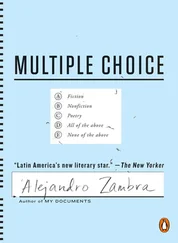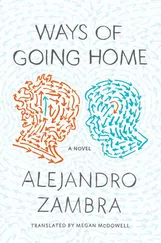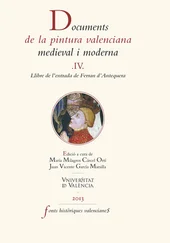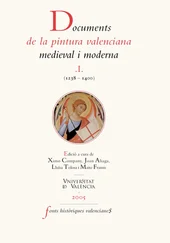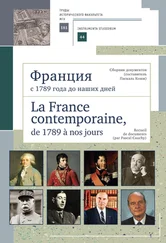After a while Danilo let out a laugh, or a sneeze. “If you want a perfect world, smoke another one,” he told her, and he went to his room to watch TV. Yasna and the writer stayed in the living room, and even though there was no music, Yasna started to dance, and without much preamble she took off her dress and her bra. Astonished as he was, he kissed her awkwardly, he touched her breasts, caressed her between her legs, he took off her underwear and slowly licked the down on her pubis, which wasn’t black like her hair, but brown. But she got dressed again suddenly and apologized, she told him she couldn’t, she said she was sorry, but it wasn’t possible. “Why not?” he asked, and in his question there was confusion but there was also love — he doesn’t remember it, he would be incapable of remembering it, but there was love.
“Because we’re friends,” she said.
“We’re not such great friends,” he answered, completely serious, and he repeated it many times. Yasna let out a peal of beautiful, stoned laughter, a real and delicious guffaw that only very gradually wore itself out, that lasted ten minutes, fifteen minutes, until finally she managed to find, with difficulty, the way back to a serious and resonant tone with which it would be appropriate to tell him that this was a good-bye, that they could never see each other again. He didn’t understand, but he knew it didn’t make sense to ask any questions. They sat with their arms around each other in a corner. He took Yasna’s right hand and calmly began to bite and eat her fingernails. He doesn’t remember this, but while he looked at her and bit her fingernails he was thinking that he didn’t know her, that he would never know her.
Before they left they sat for a while with Danilo, in front of the TV, to watch an eternal game of tennis. She drank four cups of tea at an impressive speed, and she ate two marraqueta rolls. “Where’s your mom?” she asked Danilo suddenly.
“Over at an aunt’s house,” he answered.
“And where’s your dad?”
“I don’t have a dad,” he answered. And then she said:
“You’re lucky. I do have one. In my house there’s a rifle and I’m going to kill my father. And I’m going to go to jail and I’m going to be happy.”
By now it’s three in the afternoon, he doesn’t have much time left. He urgently turns on the computer, annoyed by the seconds the system takes to start up. He writes the first five pages in a matter of minutes, from the moment the detective arrives at the scene of the crime and realizes he has been there before, that it’s Joana’s house, until he climbs up to the attic and finds the old boxes with clothes from the time when they were a couple, because in the story they were a couple, but not for very long, and in secret. He also finds the globe he’d given her — but without the stand that held it — and a backpack he thinks he recognizes in among the fishing rods and reels, the buckets and shovels for the beach, the sleeping bags and rusted dumbbells. He keeps looking around, impelled more by nostalgia than a desire to find evidence, and then, just like in books, in movies, and also sometimes in reality, he finds something that would not be conclusive to anyone else, but that is, immediately, to him: a box full of drawings, hundreds of drawings, all portraits of her father, ordered by date or series, but each more realistic than the one before, at first sketched in pencil, and then, the majority, in the green ink of a Bic pen, fine-point. When he sees the accentuated contours, gone over so many times that the paper is often torn, and when he notices the exaggeration of the features — though never to the point of caricature, they never lose the aura of realism — the detective understands what he should have understood a long time before, what he hadn’t known how to read, what he hadn’t known how to say, hadn’t known how to do.
The writer works at a cruising speed through the intermediate scenes, and takes great pains over the final two pages, when the detective finds Joana in a boarding house in Dalcahue and promises he will protect her. She tells him in great detail about the crime, put off so many times over the course of her life, and while she cries she seems to grow calmer. Maybe they stay together, in the end, but it’s not certain. The ending is delicate, elegantly ambiguous, though it’s not clear what it is the writer thinks is ambiguous, or delicate, or elegant about it.
It’s not a great story, but he sends it off with a clear conscience, and he even has time to drink a pisco sour and eat some yucca a la huacaína before his friends get to the Peruvian restaurant.
It’s not a great story, no. But Yasna would like it.
Yasna would like the story, though she doesn’t read, she doesn’t like to read. But if it were made into a movie, she would watch it to the end. And if she caught a repeat of it and she didn’t remember it, or even if she remembered it well, she would watch it again. She doesn’t often watch movies, in truth, nor does she often recall the writer. She doesn’t even know he is a writer. She did remember him a few months ago, though, when she was walking in the neighborhood where he used to live.
They had declared her father terminally ill, and recommended she give him marijuana to help with the pain. She’d thought of Danilo’s plants, hence that walk through the old neighborhood, which seemed erratic but was not: she enjoyed the luxury of walking around aimlessly, peripherally, even reaching the end of a street and then retracing her steps, as if she were searching for an address. But she knew perfectly well where Danilo lived, still in his family home; she merely wanted to enjoy that luxury, modest as it was. Her father was sleeping more calmly by then, with less pain than on previous days, so she could go out for a walk and take her time.
“I hope you haven’t killed your father,” he said to her when he finally recognized her, and since she didn’t remember her words from that night almost twenty years before, she looked at him with alarm. Then she remembered her plan, the air rifle, and that crazy afternoon. She felt an uncomfortable happiness when she remembered those lost details, as Danilo talked and cracked jokes. She liked that house, the atmosphere, the camaraderie. She stayed for tea with Danilo, his wife, and their son, a dark-skinned, long-haired boy who spoke like an adult. The woman, after looking at Yasna intensely, asked her what she did to stay so thin.
“I’ve always been thin,” she answered.
“Me too,” said the boy. She bought a lot of marijuana, and Danilo also threw in some seeds.
It’ll be a while before the plant flowers. She is watering it now while she listens to the news on the radio. Her father doesn’t rape her anymore, he wouldn’t be able to. She hasn’t forgiven him, she’s reached a point where she doesn’t believe in forgiveness, or in love, or in happiness, but maybe she believes in death, or at least she waits for it. While she moves the furniture around in the living room, she thinks about what her life will be when he dies: it’s an abstract feeling of freedom, maybe too abstract, and for that reason uncomfortable. She thinks of an ambiguous pain, of a disaster, calm and silent.
She hears her father’s complaints coming from the kitchen, his degraded, corrupted voice. Sometimes he shouts at her, berates her, but she pays him no mind. Other times, especially when he is high, he laughs his labored laughter, utters disjointed phrases. She thinks about the will to live, about her father clinging to life, who knows what for. She brings him another marijuana cookie, turns on the TV for him, puts his headphones on for him. She stays awhile beside him, looking at a magazine. “I didn’t believe in God, but only with his help could I overcome the pain,” says a famous actor about his wife’s death. “It’s simple: lots of water,” says a model on another page. “Don’t let public tantrums get to you.” “It’s her second TV series so far this year.” “There are many ways to live.” “I didn’t know what I was getting mixed up in.”
Читать дальше

